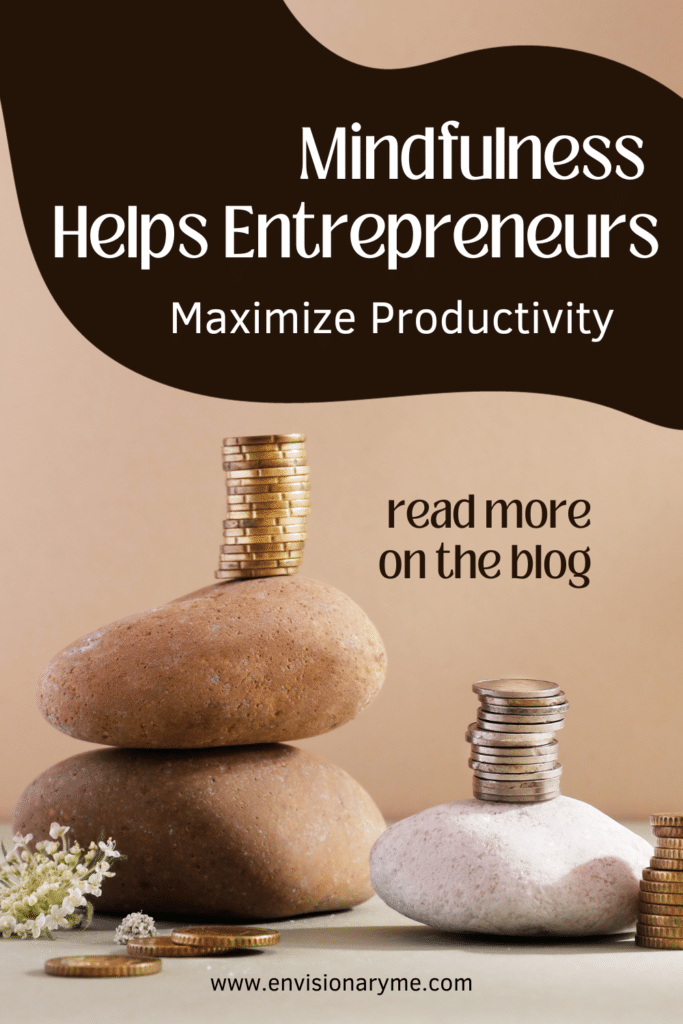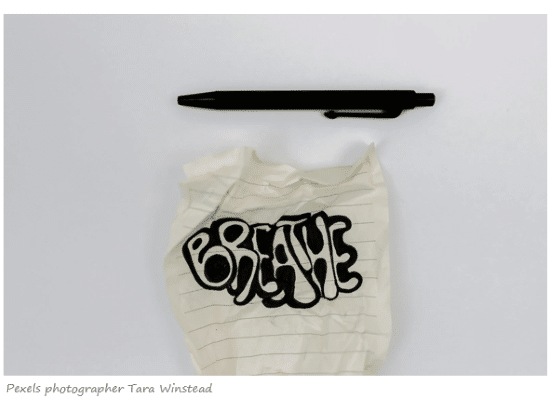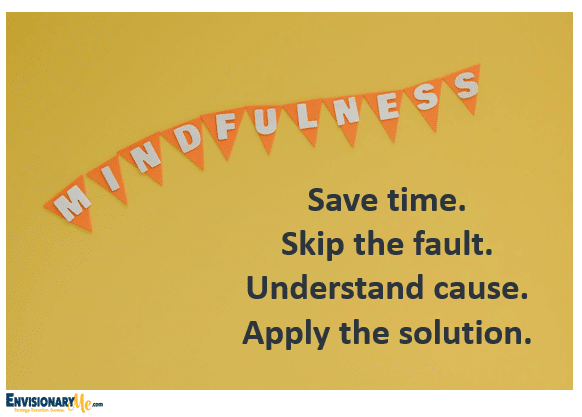Mindfulness for entrepreneurs greatly improves personal productivity. The mindfulness practice of asking yourself entrepreneurial, mindful questions helps reduce stress while maximizing your time. The metacognitive insights are especially helpful as you create and execute your business plan.

The definition of mindfulness is a mental state achieved by focusing your awareness on the present moment, while calmly acknowledging and accepting your feelings, thoughts, and bodily sensations, according to Dictionary.com. Mindfulness is often associated with meditation.
Meditation and mindfulness do work well together. People call the process mindfulness meditation because a person consciously focuses for a particular time.
Though mindfulness is commonly used as a therapeutic technique, we use it as a business thinking strategy. Entrepreneurship is complicated, ever changing and met with continual challenges. It’s wise to adopt a mindset that helps you let go of distracting thoughts and improves your strategic thinking.
There are many techniques and approaches to help an entrepreneur become more mindful and maximize productivity. This particular one involving questioning and contemplation is easy, requires no money or extreme allotment of time, and provides numerous benefits.
As we move on, understand that mindfulness is paying attention to what’s happening right now rather than thinking about what happened in the past or worrying about the future.
Is the past important? Yes.
Is planning for the future important? Yes.
Practice mindfulness to gain insights that help you throughout your entrepreneurial journey – when starting a business, when you’re growing a business, and when you hit a hurdle.
The concept of mindfulness is an entrepreneur’s dream.
Successful entrepreneurs work well in a mindful state – even when faced with extreme uncertainty.
Entrepreneurs benefit from mindfulness:
The ways mindfulness can make a difference stretch from personal to business and beyond.
- Creates metacognitive insights
- Improves cognitive performance
- Improves physical health
- Improves mental health
- Reduces stress
What does that look like on the job? Mindful thinking and activities help you achieve better results.
- You become more aware of the task at hand.
- Your focus and concentration improve.
- You respond to situations more skillfully.
- You spend your time mindfully without an agitated need to multitask.
- Your thinking becomes clear and creative.
- Mindfulness training helps keep your thoughts and emotions under control.
- You have self-compassion and the ability to take regular breaks.
- You choose healthy coping strategies such as knowing when to take a break or walk away.
- All of this helps you recover faster without letting stressors and stressful situations overtake your day.
- Practicing mindful techniques leads to overall increased brain function.
You’re ready!
Getting started looks like this!
It’s not a fussy process at all. You choose how to sit calmly and think. If you think with music, turn it on. If music is a distraction, turn it off.
If you house is too busy in the morning, give yourself 10 minutes in the middle of the or in the evening.
Consider these questions as part of affirmation, while you meditate or if manifestation is more your style.
— Or simply over morning coffee, a walk, a run or a quiet moment before planning out your day.
Create your moment using the Calm app or another of your choice.
Choose a question or a few.
It’s up to you but do this regularly if not daily, and get to know yourself, why you do what you do, and then use those insights to become more productive.
What comes after the questions?
Productivity. Creativity and Innovation. Reduced stress.
Use your learnings as part of your daily planning.
Use your learning as part of your business planning – craft your vision, your mission, your goals.
Metacognition is seriously underutilized secret weapon!

Mindfulness for entrepreneurs starts here.
- What am I like?
- What sort of worker did I develop into?
- What things make me happy?
- When am I tranquil?
- How do I feel about myself?
- How do I feel about my life?
- Am I satisfied with my life?
- When do I feel most connected to my authentic self and fully alive?
- When stressed or overwhelmed, how do I find my place of peace inside?
- What work-related situations or literal things make me happy?
- What are my special skills? What times or actions do I take that make me feel brilliant?
- Do I let myself feel brilliant?
- Am I consistently embodying the values and principles I believe in?
Enhance your level of self-awareness by looking inside.

Mindfulness at work begins while planning your day.
As you are pouring a cup of coffee or driving to work, considering mindfulness questions can help you focus and plan your day.
- How do I feel this morning?
- How do I feel about myself today?
- How do I feel about my life today?
- Is there any hiccup throwing off my mojo today?
- If so, what are my options? (remember – YOU have choices. YOU are in control.)
- What is my intention for today?
- What do I want out of this day?
- What is the most important thing I need to do today?
- What can I do to make this a good day?
- How will I take care of myself today?
- How can I make someone else’s day better?
- What unexpected, nice thing can I do for someone?
- How can I express my gratitude and to whom?
A self-check-in helps you remain both mindful and present.
Commit to mindfulness and relieve stress and anxiety.
- What recent decision resonates most genuinely with who I am right now?
- When I reflect on my life, which moments or experiences will truly matter to me?
- What aspects of myself do I struggle to fully accept and embrace?
- What worries me?
- What worries me about my business?
- Is the worry fact-based or is an underlying driving it?
- What annoys me?
- Am I annoyed often? How do I react?
- Do I regularly feel stressed?
- Do I have a greater sense of being less mindful?
- How does it affect my day? How much time do I lose as a result?
Know your stressors. Know your triggers.
Trigger can be an overused word and we can use them a negative crutch. The fact is though, triggers are simply what causes behavior.
Know what yours are because they affect your day in a positive or negative manner. Sometimes we’re so busy that we don’t realize we have a choice and can set ourselves up for success.
You do have options. Know your options for turning the negative around.

Use mindfulness regularly and notice higher productivity.
- How do I describe my relationship with myself at home?
- How about on the job?
- What are my flaws?
- Do I see my own flaws in others?
- Am I understanding of others or how do I react to those flaws?
- How does that affect my results?
- How do I act or react in times of conflict with others?
- How do I behave when I’m stressed?
- Am I easy to work with?
- In a recent conflict, what perspectives or truths was I unwilling to acknowledge or accept?
- Do I consistently embodying the values and principles I believe in?
- Where can I cultivate forgiveness within myself or towards others?
- How can I practice compassion towards both me and others?
- What truly matters to me in the grand scheme of life?
- If I had limited time left to live, how would I use my time?
- What is the present moment inviting me to notice or be aware of?
Cultivate self-awareness. Allowing yourself to observe your own thoughts, emotions, and behaviors without judgment.
Think clearly about your priorities. It’ll lead to better decision-making and ensure you are aligned with your values and goals.
What Is Thoughtful Risk Taking? (envisionaryme.com)
Entrepreneurial mindfulness allows you to see immediate results!
- What am I most proud of accomplishing recently?
- What would do I want to learn for my business
- What do you love doing for my business
- What do I do well?
- What do I like about myself as relates to my business?
- What 3 words best describe me at work?
- Who are my greatest supporters
- Where do I see myself in 1 year?
- Where do I see myself in 5 years? 10 years?
- Are my actions aligned with my core values?
- What assumptions could be influencing my perceptions?
How is mindfulness helping you and your business?
Challenging your limiting beliefs and gaining new insights is helping you grow as a person.
Improving your relationship with yourself leads to greater empathy, compassion, and a better understanding of others. Even a sole proprietor works with others, right?

Adopt a mindset of positivity. Mindfulness meditation will help you recognize all you accomplished.
What transpired today will lead to setting your priorities for tomorrow.
Closing your day on a positive makes you a better entrepreneur.
- Did I get closer to my goals today?
- What obstacles did I face today?
- How can I express my gratitude and to whom?
- Did I try my best today?
- What success did I experience today?
- Do I create my successes or are they are result of following through on opportunities others present to me?
- What did I learn today?
- What surprised me today?
- What 3 things am I thankful for today?
- How can I do better tomorrow?
Pragmatic critical thinking is obviously important to your developing business, and this meditation practice is one way to up your game.
Mindfulness exercise helps you become your very best self. Every entrepreneur can benefit from practice in mindfulness. The success to mindfulness is being open to it, similar to the benefits of meditation.
Use the metacognitive insights gained from mindfulness questioning to create your daily plan and set priorities. Use the insights to elevate your business planning process and to craft your vision, your mission, and create or update your goals.
Equally important – use metacognition to help make sure you are productive and follow through. The practice of mindfulness for just minutes a day is very helpful to an entrepreneur!
The increased awareness of your own thoughts, feelings, and behaviors helps you manage stress, while building self-esteem and helping you overcome fears. It takes a great deal of confidence and tenacity to be an entrepreneur. Mindfulness benefits you – and your business! Be fully present. You got this.
How Entrepreneurs Write A Business Plan: 10 Simple Steps (envisionaryme.com)

0 Comments